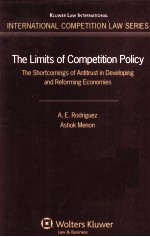图书介绍
The limits of competition policypdf电子书版本下载

- A.E. Rodriguez 著
- 出版社: Wolters Kluwer Law & Business ;Kluwer Law International ;Sold and distributed in North Central and S
- ISBN:9041131779
- 出版时间:2010
- 标注页数:203页
- 文件大小:13MB
- 文件页数:221页
- 主题词:
PDF下载
下载说明
The limits of competition policyPDF格式电子书版下载
下载的文件为RAR压缩包。需要使用解压软件进行解压得到PDF格式图书。建议使用BT下载工具Free Download Manager进行下载,简称FDM(免费,没有广告,支持多平台)。本站资源全部打包为BT种子。所以需要使用专业的BT下载软件进行下载。如 BitComet qBittorrent uTorrent等BT下载工具。迅雷目前由于本站不是热门资源。不推荐使用!后期资源热门了。安装了迅雷也可以迅雷进行下载!
(文件页数 要大于 标注页数,上中下等多册电子书除外)
注意:本站所有压缩包均有解压码: 点击下载压缩包解压工具
图书目录
Chapter 1 Introduction 1
Chapter 2 The Emergence of Competition Policy Regimes 19
Chapter 3 The Errors of Antitrust 31
Chapter 4 The Performance Gap 49
Chapter 5 What Is Competition Policy? 77
Chapter 6 Sources of Error in Antitrust Practice 95
Chapter 7 What Is Different in Developing and Transition Economies? 117
Chapter 8 The Political Economy of Antitrust Enforcement 135
Chapter 9 International Harmonization of Competition Policy 143
Chapter 10 The Limits of Competition Advocacy 159
Chapter 11 Concluding Comments 167
Bibliography 171
Table of Cases and Statutes 193
Index 195
Chapter 1 Introduction 1
1.1. Realization and Embrace 6
1.1.1. A Technocratic Experiment 7
1.1.2. A Gateway 9
1.2. The Supply of Antitrust 10
Chapter 2 The Emergence of Competition Policy Regimes 19
2.1. The Process of Adoption 21
2.2. Ignorance or Acquiescence? 25
Chapter 3 The Errors of Antitrust 31
3.1. Antitrust Decision-Making and the Error-Cost Framework 33
3.2. How is a Competition Authority to Decide? 42
3.3. The Error-Cost Framework: The United States Experience 44
3.4. Concluding Comment 48
Chapter 4 The Performance Gap 49
4.1. The Performance Gap 50
4.2. Appraising Competition Agency Performance 54
4.3. The Gap: Explanations 55
4.4. Antitrust Decision-Making in the United States 63
4.4.1. Change in Competitive Vigor 65
4.4.2. Change in Competitive Dynamics 66
4.5. Recognizing Antitrust's Unintended Effects 67
4.5.1. Policy Implications 72
4.6. Conclusion 73
Chapter 5 What Is Competition Policy? 77
5.1. Economics and the Competition Law 80
5.2. The Goal(s) of Antitrust 83
5.3. The Proscribed Practices 85
5.3.1. Concerted Practices 87
5.3.2. Merger Review 89
5.3.3. Unilateral Behavior 91
5.4. Conclusion 93
Chapter 6 Sources of Error in Antitrust Practice 95
6.1. The Goal(s) of Antitrust 97
6.2. The Errors of Economics 101
6.3. The Price Discrimination Syllogism 104
6.4. The Imprecision of Market Definition 107
6.5. Calculating Market Concentration 109
6.6. Analysis of Entry 110
6.7. Mergers 111
6.8. The Limitations of a Weak Judicial System 113
6.9. The Unavailability of Ancillary Institutions 114
6.10. Training and Manpower 115
6.11. Conclusion 115
Chapter 7 What Is Different in Developing and Transition Economies? 117
7.1. The Legacy 121
7.2. The Consequences 126
7.3. Conclusion 132
Chapter 8 The Political Economy of Antitrust Enforcement 135
8.1. A Model 136
Chapter 9 International Harmonization of Competition Policy 143
9.1. The Proposals for International Harmonization 144
9.2. Harmonization: Pros and Cons 147
9.2.1. The Trade-Begets-Cartels Argument 148
9.2.2. The Transactions Cost Argument 148
9.2.3. The Minimize-International-Competitive-Distortions Argument 149
9.3. A Critical Examination of Harmonization Arguments 150
9.4. Conclusion 156
Chapter 10 The Limits of Competition Advocacy 159
10.1. The Competition Agency as Consumer Advocate 161
10.2. Rent-Seeking and Special Interests 162
10.3. Conclusion 166
Chapter 11 Concluding Comments 167
Bibliography 171
Table of Cases and Statutes 193
Index 195